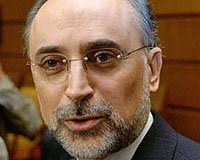| . |  |
. |
Vienna (AFP) Nov 27, 2009 The UN nuclear watchdog on Friday passed a resolution condemning Iran for secretly building a uranium enrichment plant and demanded the Islamic republic freeze construction of the facility. China and Russia joined forces with Britain, France, Germany and the United States to push through a resolution at the International Atomic Energy Agency's board on the second and last day of its traditional November meeting. Western powers have long suspected the Iran, despite its fierce denials, is trying to build a nuclear bomb. But in the past they have struggled to get diplomatic backing from China and Russia. Twenty-five nations on the 35-member board voted for the censure, which was the first against Iran since February 2006. Only Venezuela, Malaysia and Cuba voted against. In Tehran, however, the resolution was dismissed as "theatrical and useless." Iran's ambassador to the IAEA, Ali Asghar Soltanieh, said it created a "confrontational environment". Russia and China, which have close links to Iran, came on board following the revelation in September that Iran had been secretly building a second uranium enrichment plant near its clerical capital of Qom. Uranium enrichment is the process used to make fuel for nuclear power plants, but when extended it can also produce fissile material for an atomic bomb. Moscow said it expected Tehran to "treat with all seriousness the signal contained in the resolution... and ensure full cooperation with the agency." "Our patience and that of the international community is limited, and time is running out," said White House spokesman Robert Gibbs said. "If Iran refuses to meet its obligations, then it will be responsible for its own growing isolation and the consequences." Iran, which insists its nuclear programme is for peaceful energy purposes, has been enriching uranium at a bigger plant in Natanz for several years, in defiance of UN sanctions to halt all such activity. In February 2006 the IAEA referred Tehran to the UN Security Council over its refusal to suspend enrichment and agree to full IAEA inspections. The new resolution will likewise be reported to the UN Security Council. Iranian ambassador Soltanieh insisted that Qom was "now under IAEA safeguards and it will continue to be under the IAEA safeguards." Nevertheless, there would be "natural consequences for a resolution like this because this is a hostile, unfriendly gesture," he said. "One of the first consquences is that it will jeopardise the cooperative environment. It creates a confrontational environment," he warned, adding that Tehran would now only meet its legal obligations under its safeguards agreement with the IAEA, "no more, no less." In Tehran, Iranian Foreign Ministry spokesman Ramin Mehmanparast "branded the issuing of the resolution as ... a theatrical move aimed as pressuring Iran and described such behaviour as useless," the official IRNA agency reported. "We do not deem it necessary to fully carry out commitments to the agency if Iran's basic rights as a member of the Non-Proliferation Treaty are not met," he said. The IAEA had brokered a deal under which Russia would lead a consortium that would enrich uranium for Iran to use in a medical research reactor. Iran would also consider "other options" to get fuel for its research reactor, Soltanieh continued. Britain meanwhile said the resolution sends the "strongest possible signal". Iran's arch-foe Israel welcomed the resolution and called for tough international sanctions. "The passing of the resolution with a large majority shows that the international community reached the conclusion that Iran's nuclear programme... is becoming a significant and urgent threat to world peace," the foreign ministry said in a statement. And it called on the international community "to make sure that this resolution has practical meaning by setting a binding timetable for its implementation and heavy sanctions on Iran should it defy it." German Foreign Minister Guido Westerwelle said: "Tehran must finally and in full transparency reveal to the IAEA the nature and extent of its nuclear programme and fulfil its obligations towards the international community. "The international community is still seeking dialogue with Iran but time is pressing," Westerwelle added. "Our hand is still extended and I hope Iran will take it."
Share This Article With Planet Earth
Related Links Learn about nuclear weapons doctrine and defense at SpaceWar.com Learn about missile defense at SpaceWar.com All about missiles at SpaceWar.com Learn about the Superpowers of the 21st Century at SpaceWar.com
 Iran not opposed to sending uranium abroad
Iran not opposed to sending uranium abroadTehran (AFP) Nov 24, 2009 Top Iranian officials said on Tuesday Tehran is ready to send its low-enriched uranium abroad provided there is simultaneous exchange on its own soil of nuclear fuel processed by world powers. Iranian officials said a simultaneous exchange of uranium inside Iran would garantee that Tehran would receive the fuel required for its research reactor. "The guarantee sought by the Islamic ... read more |
|
| The content herein, unless otherwise known to be public domain, are Copyright 1995-2009 - SpaceDaily. AFP and UPI Wire Stories are copyright Agence France-Presse and United Press International. ESA Portal Reports are copyright European Space Agency. All NASA sourced material is public domain. Additional copyrights may apply in whole or part to other bona fide parties. Advertising does not imply endorsement,agreement or approval of any opinions, statements or information provided by SpaceDaily on any Web page published or hosted by SpaceDaily. Privacy Statement |